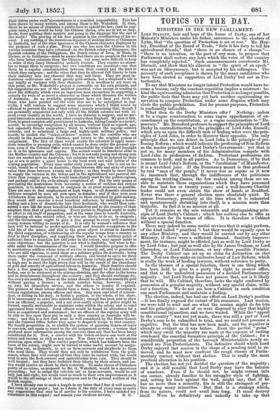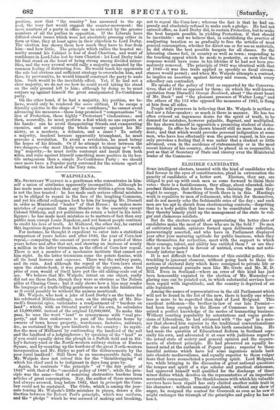TOPICS OF THE DAY.
MINISTERS IN THE NEW PARLIAMENT.
LORD Sreas-LET, heir and hope of the house of Derby, one of her Majesty's Ministers under his father, announces to the electors of Lynn, that " the question of Protection is set at rest." Mr. Hen- ley, President of the Board of Trade, "feels it his duty to tell his agricultural Mends," that "there is no chance of a change"—' "there is no intention, on the part of any man, to propose that Parliament shall restore any laws which the voice of the country has completely rejected." Such announcements corroborate Mr. Disraeli, and show that his allusion to "the spirit of an epoch" was not an idiosynoracy, but is accepted by his colleagues. The necessity of such acceptance is shown by the many candidates who have been elected as supporters of Lord Derby but not as Pro-
tectionists. '
To say that Ministers no longer intend Protection would have be- come a truism, only the constant repetition implies a mistrust : be- hind the equivocating admission that Protection is no longer possible, the public feels that there may yet lurk, another equivocating re- servation to compass Protection under some disguise which may elude the public prohibition. But for present purposes, Protection is confessedly infeasible.
What then do the Derby Ministers offer ? Nothing; unless it be a vague counteraction to some vague apprehension of en- croachment on the constitution, or a vague counteraction to " De- mocracy." Mr. Beresford professes to support the principles of Lord Derby m contradistinction to the principles of Lord John Russell; which sets us upon the difficult task of finding what were the prin- ciples of Lord John, in order to discover their opposite. The only principle that we can detect in Lord John is the principle of pro- fessing Reform; which would indicate the professing of Non-Reform as the master principle of Lord Derby's Government: yet that is not so, for many members of his Administration compete with Lord John in professions of Reform. Protestant professions are common to both, and to all parties. As to Democracy, if by that is meant Lord John's Reform or the " Jacobinism " of Manchester, it is a wretched joke. If the Democracy meant is that professed by real. "men of the- people," it never was- so supine as it now is ; insomuch that, through the indifference of the politicians among the working classes, the few zealous among them are un- able to maintain those organizations which they have possessed for these last ten or twenty years; and a well-known Chartist leader could not even obtain the show of hands at Bradford. Never was there a general election more absolutely quiet. To oppose Democracy, precisely at the time when it is exhausted and spontaneously shrinking into itself, is a mission more than Quixotic. In fact it is no mission at all.
Yet it remains as the sole ostensible and distinguishing prin- ciple of Lord Derby's Cabinet ; which has nothing else to offer as the quit-rent for its tenure of office. It is therefore a Cabinet without a special function. There may indeed be some useful services that it might perform, of the kind called" practical ": but they would be equally open to any other Ministry, and they would be carried out by any other Ministry, if there were a sufficient demand. Sanitary Improve- ment, for instance might be effected just as well by Lord Derby as by Lord John; but just as well also by Sir James Graham, or Lord Clarendon, or Lord Palmerston, or any other possible Premier. The Derby Cabinet can set up no claim for distinction on that score. Nor can they make an exclusive boast of Law Reform, which is really the work of leading lawyers, without reference to party-.
In the absence of a special function, there is one thing which has been held to give to a party the right to possess office, and that is the undoubted possession of a decided Parliamentary majority : but Lord Derby does not possess that, nor is it likely that he will. His Cabinet, therefore, lacks the right conferred by possession of a genuine majority, without any special claim, with- out a function. We do not see how a Cabinet in such condition can meet Parliament and maintain a footing.
The election, indeed, has had one effect on Lord Derby's position —it has finally exposed the extent of his resources. Last session, we were told to wait and see what the session might do for him and his principles : most of us were disposed to obey that highly constitutional injunction, and we have waited. While the " appeal to the country" was not yet made, there was still a part of Lord Derby's case to be submitted to trial, and we could not presume a negative. But the trial has now been made, and the negative is already as evident as it was before. Even the partial " gains " which may swell the minority are made at the expense of casting overboard the essential formative principle of the Cabinet ; for a considerable proportion of the borough Ministerialists newly ac- quired are Non-Protectionists. The defensive shield which Lord Derby enjoyed last session in the shape of a pending trial is re- moved, and he must now confront the rough storms of Parlia- mentary contest without that shelter. This is really the most practical alteration in his position. The election has not yet decided the question of the majority ; and it is still possible that Lord Derby may have the balance of numbers. Even if he should not, he might retreat into one corner, already familiar to his smuggler style of fighting, and, setting his back against the wall, might say, that if he has no more than a minority, his is still the strongest of par- ties among many minorities. But that is a strategy which, from its nature, could not avail him long. It must destroy itself. Were he definitively and nakedly to take up that position now that "the country" has answered to the ap- peal, the very fact would enggest the counter-movement : the mere numbers of a party in office can be outvoted by the greater numbers of all the parties in opposition. If the liberals have differed about issues which were not absolutely pressing either in form or time, they at least agree in their objection to Lord Derby. The election has shown them how much they have to fear from him—and how little. The principle which rallies the boasted mi- nority around his Cabinet is fear of dead Chartism, and want of confidence in Lord John lest he turn Chartist : let Lord Derby take his final stand on the boast of being strong among divided minor- ities, and the very avowal would rally a majority animated by the common feeling of distrusting him. He would teach his opponents the sole but obvious and sufficient strategy to overwhelm him, and thus, by provocative, he would himself construct the party to undo him. Such would be the inevitable effect. Yet, if he had not a clear majority, we do not see how he could avoid taking his stand on the only ground left to him; although by doing so he must conjure up against himself the great amalgamated No-Confidence party.
On the other hand, if he had a majority, his position, we be- lieve, would only be rendered the more critical. If he escape a friendly quietus in the shape of "no confidence," he cannot avoid advancing his measures—those long-promised " compensations " in lieu of Protection, those highly " Protestant " vindications ; and then, assuredly, he must perform a feat which no one expects at, his hands : can he avoid disappointing friends and exasperating enemies, and so raising the whole country against his Mi- nistry, as a mockery, a delusion, and a snare ? To satisfy a majority, insolent because apparently triumphant, he must provoke a revolution. To avoid a revolution, he must betray the hopes of his friends. Or if he attempt to steer between the two dangers,—the most likely course with a trimming or " work- ig" majority,—he must invite contempt and insult from both sides, and raise against himself something more positive in its hos- tile antagonism than a simple No-Confidence Party : we should once more have a Popular party convened for the serious sport of hunting out the last nest of the Tory rats.



























 Previous page
Previous page